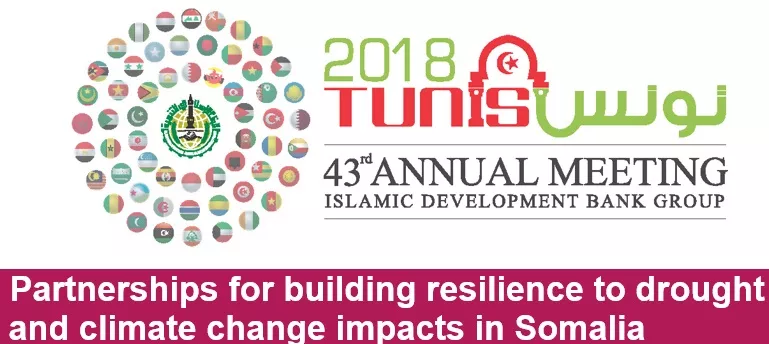IDB-ICBA-IFAD-SDRI Joint Event "Partnerships for building resilience to drought and climate change impacts in Somalia"
Overview
As the general theme for 43rd Annual Meeting of the Islamic Development Bank Group (IsDB Group) is about “Partnerships”, the Ministry of Agriculture and Irrigation, Federal Government of Somalia, the International Center for Biosaline Agriculture (ICBA), the International Fund for Agricultural Development (IFAD) and the Somali Disaster Resilience Institute (SDRI) will co-organize a seminar titled Partnerships for building resilience to drought and climate change impacts in Somalia. The event will discuss how partnership between IsDB and its partners can:
- Develop the in-country drought response capacity, so that actions are proactive and based on risk management rather than reactive and based on crisis management;
- Introduce and scale-up climate-smart agriculture to ensure food security and strengthen resilience in areas vulnerable to drought;
Implement development programs in fragile and conflict-affected states such as Somalia by working in partnership with local stakeholders.
Background
Somalia has been suffering from effects of recurrent droughts since the 1980s. The country is particularly vulnerable to the impacts of drought not only because of the heavy reliance on rain for its water and food security systems, but because of the present fragility of communities, government and the environment. The current drought (2015-18), allied with the impacts of the ongoing conflict and instability, has forced people to migrate and to seek shelter in Internally displaced person (IDP) camps, where they are deprived of productive opportunities and are mostly depend on hand-outs.
The recent calls for international disaster relief have been accompanied by appalling statistics on the devastating impact on people, agricultural and water systems, and the economy. The United Nations has warned that if rains fail again and urgent international action is not taken, the country could see a repeat of the 2011 famine.
One of the key objectives of the Somalia National Development Plan (SNDP) – Towards Recovery, Democracy and Prosperity 2017-2019 – is to achieve “more resilient communities that can withstand internal and external shocks, including cyclical droughts and other natural disasters.” There is a strong stated emphasis in the SNDP on reviving Somalia’s traditional economic sectors, such as agriculture, livestock and fishing, utilizing the strengths of the private sector. It should be noted that Somalia is a net food importer and even during good harvest years only around 40-50 per cent of per capita cereal needs are met by local production.
Key Objects
- Increase awareness on the climate change impact in Somalia;
- Discuss the prospects of partnerships with Somalia among IsDB member countries;
- Link donors and international organization to support local institutions in Somalia;
- Introduce an integrated drought resilience system as a solution to combat drought, climate change in Somalia.
Target Audience
- Policymakers of IsDB member countries;
- Regional and international donors’ agencies;
- Regional and international research organizations;
- National research organization and academia of IsDB member countries.
Organizers
IDB, IFAD, ICBA, SDRI











